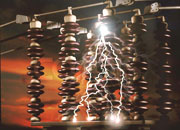The technical solution designed by MUEGC enables electric bus manufacturers to avoid extra charges related to installation of batteries with greater capacity, which in turn results in significant decrease of the buses’ costs of production and increase of their passenger capacity. Supposedly, ultrafast charging will be carried out at the bus termini or intermediate stops. Such system will allow operation of electric buses 24 hours a day with no need to charge them daily in the bus garage.
The abovementioned technical solution is based on principles of safety and passenger/driver convenience thanks to using alternate current and a unique home-grown technology – N-pin connector with a closed-loop kinematic chain.
The uniqueness of the ultrafast charging station being under development by MUEGC is a possibility to charge an electric bus even when it stops up to 2 meters before the kinematic connector.
Currently, a sample charging device is undergoing technical and climatic testing at a specially designed testing field.
‘In many countries, manufacturers are trying to meet the challenge of unification of charging standards for different makes of electric buses, but there has been no optimum choice found so far. Only manufacturers of electric cars have come to an understanding – a common charging standard is now adopted for them internationally’, says Denis Tsypulev. ‘For heavy electrical trucks, no such standard is available. We are now negotiating with Russian manufacturers of electric buses: a request was made by MUEGC to consider our solution as a common standard. If we set up the rules of the game now, we will be able to avoid serious problems in the future related to non-compatibility of charging devices, which problems are already faced by some European countries’.
Upon results of testing of the MUEGC ultrafast charging station for electric buses, a common national standard is supposed to be approved next year.
В котельном цехе Южно-Кузбасской ГРЭС смонтировали новый двухбалочный мостовой кран
Медицинский комплекс во Владивостоке к 2015 году получит 1 МВт электрической мощности


